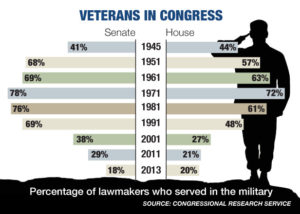I heard an interesting analysis on National Public Radio about the dysfunction that has troubled the U.S. Congress in recent years.
It is that so few members of Congress — House members and senators — are veterans. The analyst noted that today, about 20 percent of congressmen and women are veterans; that total used to be around 70 percent.
Do you see where this is going?
We’re about to celebrate Veterans Day and I thought that observation was worth noting as a way to suggest that military service has contributed to a better-functioning Congress than what we have today.
I think of the World War II veterans who came home from completing their mission to save the world from tyranny. They went about rebuilding their lives. Some of them chose careers in public service. The ran for the U.S. House and the U.S. Senate. They won and were thrown together on Capitol Hill.
They forged partnerships and friendships. They had a common bond. Their friendship crossed the partisan divide. Democrats and Republicans all had been to battle. They all had fought a common enemy.
Congressional lore is full of legendary friendships that bridged that partisan divide: Republican Bob Dole and Democrat Daniel Inouye; Republican Richard Nixon and Democrat John F. Kennedy; Republican Barry Goldwater and Democrat George McGovern. These men were political opponents, but they each respected each other. They had earned their mutual respect because of their service in defense of the nation they all loved.
The Vietnam War produced a similar bond among brothers. Republican John McCain and Democrat John Kerry became good friends during their time in the U.S. Senate. They worked together to craft a normalization of relations between the United States and Vietnam. Republican Chuck Hagel returned from ‘Nam to serve in the Senate, along with Democrat Bob Kerrey.
The Vietnam War generation, along with the World War II and the Korean War generation, contributed mightily to a government that actually worked.
That kind of camaraderie appears to be missing today. Yes, Congress is sprinkled with vets coming home from Iraq and Afghanistan. They, too, belong to both major political parties. I don’t sense that they have yet made their mark on the larger governing body. Perhaps it will come in due course.
The veterans who have served first in the military and then in both chambers of Congress have done demonstrated the value of common experience. It translates into political comity and collegiality … a lot more of which we can use today.
